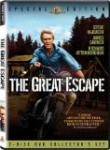I was just shy of seven years old when The Great Escape came out. I’ve watched it perhaps more times than any other movie and loved the book on which it was based almost as much. And in the course of three months this summer, it’s received some manly recognition: it not only made a list of the 75 Movies Every Man Should See, it tops another list of the 100 Must See Movies for Men.
 But other than a manliness award, The Great Escape is greatly underappreciated. It isn’t on the American Film Institute’s list of the 100 Greatest American Films. The only Academy Award nomination it got was for best film editing (it didn’t win). It did receive a Golden Globe nomination for best drama — but didn’t win. In fact, according to IMDB, the only award the movie won was a best actor award for Steve McQueen — at the 1963 Moscow International Film Festival. I’m guessing that wasn’t a highly prestigious award in the Cold War U.S.
But other than a manliness award, The Great Escape is greatly underappreciated. It isn’t on the American Film Institute’s list of the 100 Greatest American Films. The only Academy Award nomination it got was for best film editing (it didn’t win). It did receive a Golden Globe nomination for best drama — but didn’t win. In fact, according to IMDB, the only award the movie won was a best actor award for Steve McQueen — at the 1963 Moscow International Film Festival. I’m guessing that wasn’t a highly prestigious award in the Cold War U.S.
Loosely based on a true story of a mass escape from a German prisoner of war camp, the film, like many World War II movies of the 1960s and 1970s, had a star studded cast. Richard Attenborough as an RAF squadron leader and comander of the priosners, Charles Bronson as a Polish pilot in the RAF, James Coburn as an Australian flyer, James Garner as an American who joined the RAF before the U.S. entered the war and Steve McQueen as the irascible and cocky American pilot. In addition, one of the screenwriters was James Clavell, whose book about experience in a Japanese prisoner of war experience, King Rat, was a bestseller in 1962. Clavell would go on to write, produce and direct 1967’s To Sir With Love and the bestselling novel Shogun in 1962 would
For whatever reason, the movie didn’t sit with critics. Part of it was probably the length, with the movie being just shy of three hours). But it’s a movie that had everything. There were the brutal Nazis. To borrow a more modern phrase, the Germans gathered the “worst of the worst,” the Allied soldiers who were escape artists or had serial escape attempts, into the highest security prisoner of war camp. There was the indomitable spirit of the prisoners plotting a mass escape. There was McQueen, whose character, Captain Virgil Hilts, epitomized “cool.” That was reinforced by the fact Hilts was known as “the cooler king” for the amount of time he spent in solitary confinement in “the cooler” (where, of course, he passed the time with a baseball and glove). But the cool went beyond simply the screen. The film is recognized for having one of the screen’s best motorcycle chases, as McQueen tries to outrun Nazis after the escape. Those scenes were put in the movie at McQueen’s request.
So there you have it. Evil Nazis, heroic heroes and American cool. If you’re a boy growing up in the ’60s and see this movie then, how could it not become one of your favorites?
Kommandant von Luger: Are all American officers so ill-mannered?
Captain Virgil Hilts: Yeah, about 99 percent.
von Luger: Then perhaps while you are with us you will have a chance to learn some. Ten days isolation, Hilts.
Hilts: Captain Hilts.
von Luger: Twenty days.







